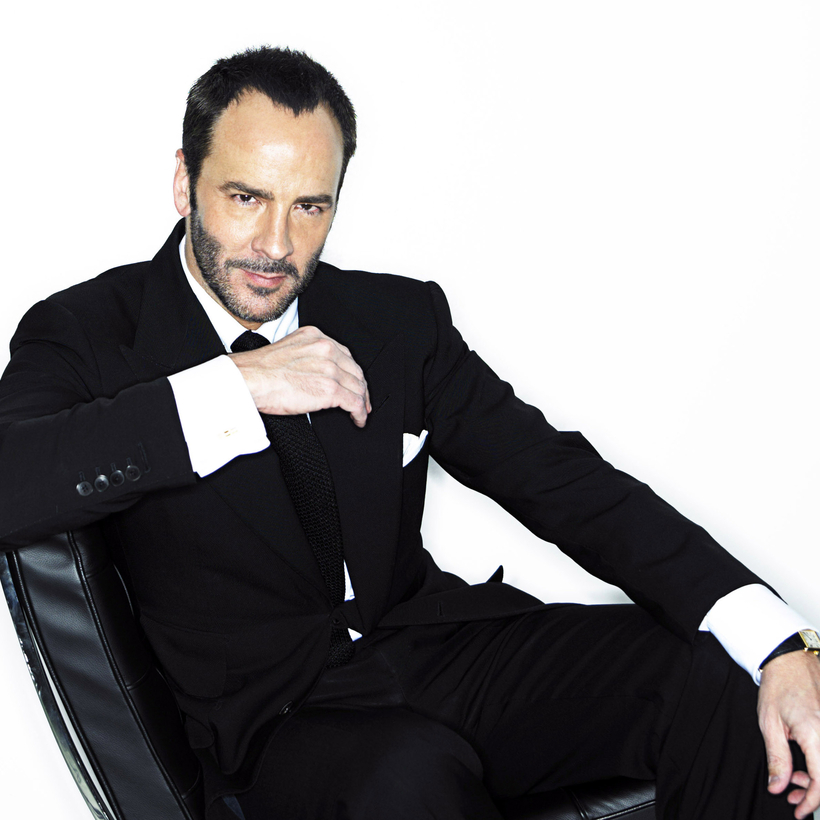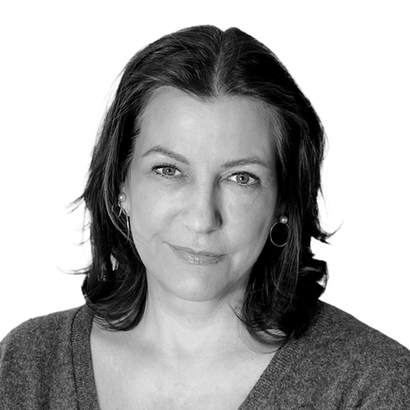Two days before the Tom Ford brand was transferred to the Estée Lauder Companies, which bought it in late 2022 for $2.8 billion, Tom Ford the man released his final women’s collection. After 35 years, he leaves behind a career in fashion and beauty that was audacious, exciting, and wildly influential. Last week, he spoke with Air Mail to discuss what’s next. But first, he wants to take a nap.
BRIDGET FOLEY: As of the end of April, you are a professional free agent.
TOM FORD: No responsibilities. I have nothing to do. I am unemployed. I am retired.
B.F.: Not retired. You plan to make movies, right?
T.F.: Yes. But what I need to do now is take a nap. My father died during Covid, and Richard [Buckley, Ford’s husband and partner of 35 years] died. My very first boyfriend, Ian Falconer, died about three weeks ago. I sold my company. We moved. I need a few months to digest everything that has happened and then start writing.
B.F.: Can you handle a months-long, do-nothing nap?
T.F.: My son, Jack, is going to camp for the first time. Somebody asked me, “What are you going to do during your two weeks?” I said, “I’m going to go to my house in New York. I’m going to be in my underwear and a dirty T-shirt. I’m going to eat bowls of cereal. I might not take a bath for three or four days at a time. I’m going to stare at the ceiling. I’m going to watch stupid television, and I just want to be left alone. Now, whether that’s because I’m with a 10-year-old all the time or because I just feel I need a little bit of a break, I don’t know.
B.F.: When the nap’s over, what kind of films do you want to make?
T.F.: A dark comedy, because that’s what life is. It’s a dark, dark comedy. Life is just so much pain, but yet so absurd. I think if you don’t approach it with a certain comedic point of view, it can kill you, life.
B.F.: You recently relocated from L.A. to Palm Beach. Interesting move, now that you’re a full-time filmmaker.
T.F.: I moved because that house in L.A. made me so sad. Richard was never well in that house. He died there. To go to the bathroom at night, I had to step out of my bed, right across from where he collapsed, and where his body lay for two hours before they came to pick him up.

B.F.: It must be so hard without Richard.
T.F.: I never appreciated how hard it is as a single parent. Even the last few years, Richard wasn’t physically able to take care of Jack, but I could say, “Richard, what do you think we should do? This is what he’s doing.” You had someone to help you make decisions—about everything, not just Jack. That’s what I miss a lot.
B.F.: Why Palm Beach? One press story implied it was a tax move.
T.F.: That was not the reason. I love L.A., but we moved back to L.A. from London for Richard’s health and for his doctors. And so, L.A. took on a very different feeling for me. Jack loves the L.A. outdoor life. I thought, Where else can I re-create Jack’s life? The answer was Florida. And by the way, Florida gets a more Republican rap [than I’m experiencing]. Jack goes to an incredibly liberal school. If [Florida governor Ron] DeSantis complains about a book, they give it out the next day. They teach critical race theory; they celebrate every holiday. I doubt there’s a Republican in that school. It is so terrific. I have a lot of very liberal friends.

B.F.: You’re still new to Palm Beach, and already you’re moving houses.
T.F.: I first bought a modern house that I loved. But then I bought a really fabulous, 1928 house built by the architect Maurice Fatio. I’m putting offices in a wing that used to be for staff. Four people that were with me in L.A. at Fade to Black [Ford’s production company] are moving here.
B.F.: Are you excited to return to filmmaking?
T.F.: The most fun I’ve ever had in my life was making my two movies [A Single Man and Nocturnal Animals].
B.F.: You don’t sound at all wistful about leaving fashion.
T.F.: I wanted to have a second career. When the bankers were putting together the presentations, they talked about me. I said, “No. Pretend I’m dead, and let’s market the brand as strong enough to exist without me. Because it is.”

B.F.: You wanted them to imagine you dead?
T.F.: Some friends tell me I’m obsessed with death. Maybe I am, but I don’t think I’m obsessed with it in a negative way. I’m aware of our time on the planet. It’s precious. If there are things you want to accomplish, you have to be aware of the clock. I have hopefully a little more than 20 years of lucidity left. I felt I had said all I could say with fashion, whereas I don’t feel I have said all I could say with film. Also, Domenico [De Sole, Ford’s longtime business partner and chairman of the board] would have retired soon. There was no way I would want to be in this business or run my company without him.
B.F.: Didn’t your relationship begin with an argument?
T.F.: I was in a handbag meeting [at Gucci]. Domenico came in and sort of stood over me, and I said, “I’m sorry, but you have to leave. I can’t work with you here.” He left. Later, we had a screaming fight in the parking lot. It was “Fuck you!” “Do not ever do that again!” “I am not working this way!” People were at the windows of the factory in Florence, staring at this. After that, he never came into another design meeting, and I never stepped into his area. Somehow, through the argument we bonded and forged a friendship that only grew as we saw that each of us knew what we were doing. We have the same work ethic—yesterday. “I don’t want it now; I want it yesterday.” And I love Domenico as a human being. I would trust him with my life.
B.F.: You have a great relationship with Lauder, but Lauder has no fashion-ownership experience. Does that concern you at all?
T.F.: When you sell your company, you sell your company. You have to be prepared to see things happen that you would not necessarily have done. But one reason I sold to Lauder is that they have been the most incredible partner [for Tom Ford Beauty] from day one. They are one of the last companies that truly understand luxury, and their commitment to quality is unequaled. I’ve known the Lauder family for years. Leonard, in particular, is someone I respect tremendously. The culture at Lauder comes from Leonard, and every person that I have dealt with there shares his values. I have complete confidence in Estée Lauder.
B.F.: What’s your take on the executive appointments? Peter Hawkings as creative director, and Guillaume Jesel as C.E.O.?
T.F.: I love Peter. He worked with me for 25 years. I wanted him to get the job. He has incredible taste; he’s a terrific leader. He is genuinely talented. I can’t wait to see what he does. I’ve also worked with Guillaume for years, at Tom Ford Beauty. He has a great knowledge of the beauty industry and of fashion in general. Guillaume is a terrific choice.

B.F.: At Gucci in the 90s, you moved the proverbial fashion needle with a bold, sexy 70s vibe. What made it magic?
T.F.: It was the right look at the right time. We were coming out of a very dark era. The very first AIDS drugs that began to work happened in about 1994–95. The last friend I had who died from AIDS would have been in about 1993. I think all of us in the fashion industry had suffered this weight so long. We had come out of the Reagan era, we had come out of the stock-market crash, we’d come out of AIDS, we’d come out of a very dark period. And I guess I felt a light at the end of the tunnel.
B.F.: It was an audacious light. Where did your audacity come from?
T.F.: I was born with it. As a little kid, I would watch somebody do a triple flip off a high dive at the Olympics, and I would think, ‘I could do that.’ Of course, I couldn’t do that. But I was born with that confidence.
B.F.: What is the biggest difference between fashion in the 90s and now?
T.F.: It’s this. [Ford holds up his phone.] It is a completely different way of thinking and interacting with the world, and it influences everything. We look at things differently; our attention spans are different. I think there’s a before and an after.
B.F.: Forbes lists your personal wealth at $2.2 billion. Are you in awe of yourself, even a little?
T.F.: In awe? No. But do I chuckle about it sometimes? A lot. I left Gucci with a lot more money than people realize. So I’ve lived very comfortably for a long time. But, yes, sometimes it almost makes me laugh. I do want to talk about a foundation.

B.F.: So talk about it.
T.F.: It’s for Jack. He will outlive me, I hope, by many, many, many years, and this will be his thing to oversee. It’s important to me that it supports causes that he loves and can personally get involved with. Jack will be 21 in 10 years. It’s going to be very real for him very fast. He’s not necessarily going to inherit a lot of money. I want him to earn his own way in the world. So this is a great way to teach him.
B.F.: He won’t inherit?
T.F.: I don’t know. I always tell him, “I’m putting you through college and then that’s that, and you have to figure it out.” But I don’t know. This is all new, and I have to think about it. Because I don’t want him to be ruined by it. But he is very ambitious. He asked me one day, “What is Harvard?” Ten days later, I got a call from his math teacher. She said he had taught all the other kids in the class what 69 was, and they went home and told their parents they’d learned all about 69 in math. I said, “Jack, I got this call.” And he said, “Is that going to go on my record? Is that going to affect me getting into Harvard?”
B.F.: Sixty-nine and Harvard—at 10! Tell me more about him.
T.F.: He’s so handsome. He’s great at sports, and he’s in the fourth grade but he’s in sixth-grade math. He comes home stressed and goes in his room and plays the piano. And then he’ll come out fine. He’s such an incredible mix of macho and sensitive, and he’s healthy. My God, I’m lucky with him. But he’s got a fucking will of steel.
B.F.: I wonder where he got that. But steel will or not, Richard’s death must have been so hard for him.
T.F.: Oh, he’s terrified that I’m going to die. I leave the room, I’m going to die. He’s terrified when I fly. When I travel without him, which isn’t often, I text his teacher, who goes over and says, “Your dad just landed safely.”
B.F.: That’s sweet.
T.F.: Usually she laughs. I text her, “I didn’t die. I landed.”
Bridget Foley is a longtime fashion journalist who spent more than 20 years as a critic and editor at Women’s Wear Daily


